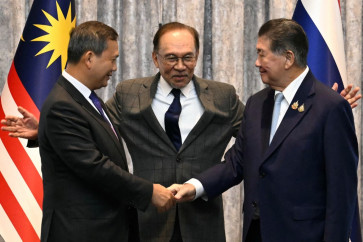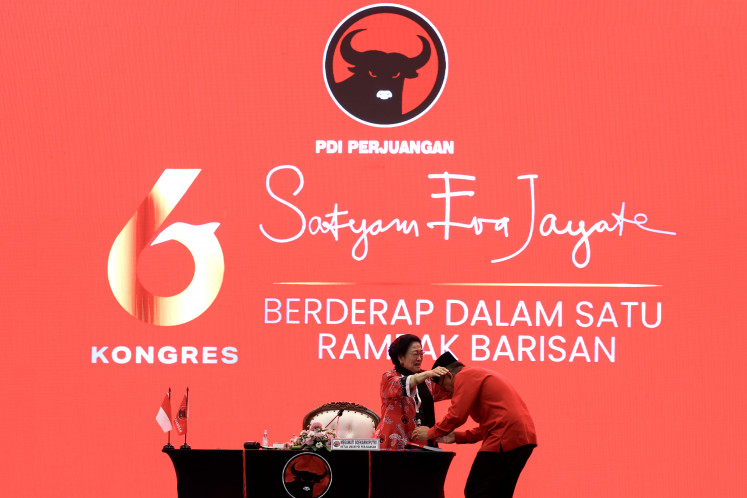Popular Reads
Top Results
Can't find what you're looking for?
View all search resultsPopular Reads
Top Results
Can't find what you're looking for?
View all search resultsPalace aides under fire over conflicts of interest
Recent controversies surrounding the perceived dual loyalties of certain expert presidential staffers have damaged public trust
Change text size
Gift Premium Articles
to Anyone
R
ecent controversies surrounding the perceived dual loyalties of certain expert presidential staffers have damaged public trust. Critics and watchdogs are advocating for a better mechanism to prevent future instances of apparent conflicts of interest.
Presidential staffer Andi Taufan Garuda Putra drew widespread criticism when he asked district heads across Indonesia to support a COVID-19 relief program led by his company, PT Amartha Mikro Fintek, in an official government letter dated April 1. He has since apologized and retracted the letter.
Another presidential staffer and the cofounder of education technology start-up Ruangguru, Adamas Belva Devara, experienced public backlash after his company was appointed as a partner in the government’s recently unveiled preemployment card program.
Belva denied accusations of conflict of interest and said on Twitter that the company had gone through “a public selection process” and that he was not involved in the decision-making process.
Following public pressure, Belva and Andi have tendered their resignation to President Joko “Jokowi” Widodo.
Belva and Andi are not the only presidential staffers to hold dual roles while in public office. Presidential spokesperson Fadjroel Rachman has maintained his previous position as president commissioner of state-owned construction company PT Adhi Karya, and economic adviser Arif Budimanta was recently appointed as a commissioner of state-owned lender Bank Mandiri.
Coordinating Economic Minister Airlangga Hartarto has also made good use of his Golkar Party platform to promote the contentious omnibus bill on job creation. Airlangga continues to hold the chairmanship of Golkar and is one of many political appointees in government.
Bivitri Susanti of the Jentera School of Law in Jakarta said Belva and Andi’s cases both clearly fell within the scope of conflict of interest as defined by Law No. 30/2014 on government administration.
Article 43, paragraph 1 of the law stipulates that conflicts of interest occur when a decision, policy or action is motivated by personal or business interests or when it leverages relationships with family members or friends, among other things.
Any decisions made when there is a conflict of interest can be revoked, according to Article 45, paragraph 2 of the law.
“The universal essence of conflict of interest is that [the official in question] does not have to directly participate in the decision-making process, but his or her position could indirectly influence said decision,” the legal expert said.
Bivitri said that more thorough background checks and stricter enforcement of the law were necessary in the appointment of public officials. After being placed on the shortlist for public office, candidates should declare potential conflicts of interest, she said.
“As they enter the establishment, people should declare if they hold a position elsewhere. [But as of now, there is no enforcement of] declarations aside from the KPK [Corruption Eradication Commission],” she said.
Zaenur Rohman, a researcher from the Gadjah Mada University Center for Anti-Corruption Studies (Pukat UGM), concurred with Bivitri, saying that declaring potential conflicts of interest should be a main requirement for officials before they assume public office.
He said the government should enact stricter regulations to prohibit officials from assuming other roles that would compromise the integrity of the public office, especially as those double roles went against the principles of good governance and ethical business practices.
The Indonesian Ombudsman has said the government’s inadequate handling of possible conflicts of interest is the reason such mishaps have been emerging recently. The office called for stronger regulations to prevent similar incidents in the future.
“All this time we have ignored the obscurity in the regulations that allows these kinds of incidents to happen, even though [the government] might not necessarily have bad intentions,” Ombudsman member Ahmad Alamsyah Saragih told The Jakarta Post over the phone. “Even so, it can lead to high [public] distrust.”
The ad hoc body has looked into the practice of double roles among public officials with possible commercial interests in an ongoing study that began in 2017, but the study has been suspended as a result of the COVID-19 outbreak in Indonesia.
The study explores practices among civil servants and aims to prove whether appointments to commissary roles at state-owned enterprises are political or based on merit, Ahmad said.
While there is an acknowledgement of the cross-sectoral nature of public office and the legal mandates that allow a person to hold multiple positions at once – as is the case with Bank Indonesia or Finance Ministry officials who can be appointed to the Financial Services Authority as per Law No. 21/2011 – preliminary findings of the study indicate that there are still regulatory loopholes that allow for the abuse of public office.
Ahmad said there were at least three problems that remained unregulated in the appointment of public officials in multiple roles: double income, competency standards and accountability.










